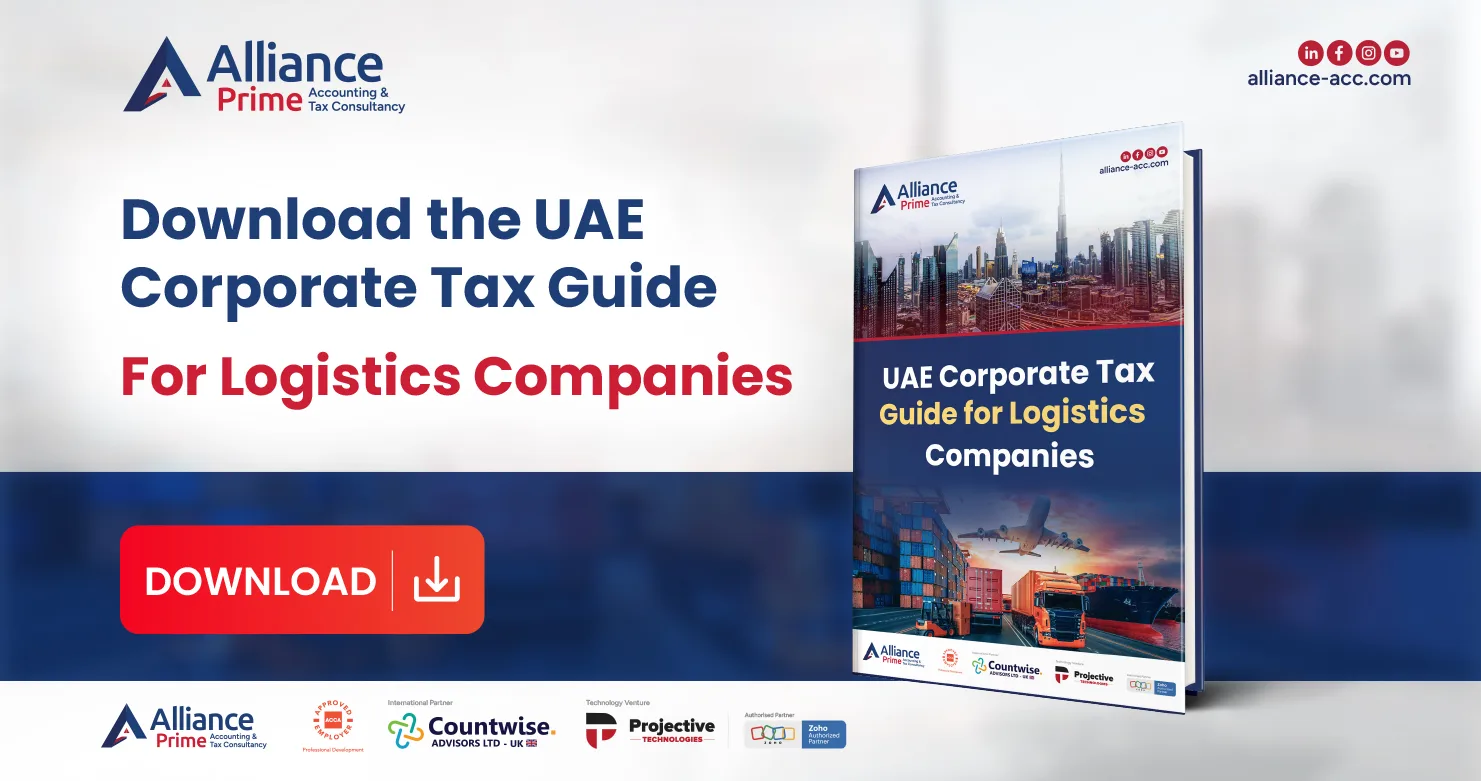The United Arab Emirates (UAE) stands as a beacon of economic prowess and strategic significance in the Middle East, with its logistics ecosystem playing a pivotal role in supporting this status. Renowned for its global connectivity, state-of-the-art infrastructure, and business-friendly environment, the UAE has emerged as a logistics hub that facilitates seamless movement of goods across the region and beyond. Is your Logistics Company prepared for the UAE Corporate Tax? You can download the Corporate Tax Guide for Logistics Companies by clicking the download link in this article.
Introduction to the Logistics Industry in UAE
At the heart of this logistics eco-system is the strategic geographical location of the UAE, positioned at the crossroads of Europe, Asia, and Africa. This unique placement has transformed the country into a global trade gateway, with its ports, airports, and road networks serving as vital conduits for the efficient transportation of goods.
The maritime sector plays a crucial role in the UAE’s logistics infrastructure, with world-class ports such as Jebel Ali in Dubai and Khalifa Port in Abu Dhabi. These ports not only handle substantial cargo volumes but also boast cutting-edge facilities, embracing technology to streamline operations and enhance efficiency. Complemented by extensive road networks and an ever-expanding aviation sector, the UAE’s logistics ecosystem seamlessly integrates various modes of transportation.
Furthermore, the UAE has actively invested in advanced technologies such as blockchain, artificial intelligence, and Internet of Things (IoT) to optimize supply chain processes. These innovations enhance transparency, reduce costs, and improve overall logistics management, contributing to the country’s reputation as a forward-thinking logistics hub.
In addition to its infrastructural strengths, the UAE’s logistics ecosystem benefits from a business-friendly environment and government initiatives that encourage foreign investment. Free zones, such as the Jebel Ali Free Zone and the Dubai Airport Free Zone, provide favourable conditions for companies to establish their logistics operations, fostering a thriving ecosystem of logistics service providers, manufacturers, and traders.
Logistics ecosystem in the UAE
Logistics is the management of the flow of goods between the point of origin and the point of consumption to meet customer requirements. The logistics company plans, implements, and controls the movement and storage of goods, services, or information within a supply chain. The process strives to find the best solution for manufacturing and distributing goods by considering how the market uses the products.
The logistics ecosystem in the UAE encompasses a diverse range of businesses, each playing a specific role in the efficient movement of goods and services.
Highlights from the UAE Corporate Tax Guide for Logistics Industry
The UAE’s new federal corporate tax (CT) introduced in June 2023 applies to most businesses operating in the country, including those in the logistics industry. While the CT framework is generally applicable, certain aspects require nuanced understanding for logistics companies. Here’s a breakdown of key elements of the CT law relevant to the logistics industry:
General Taxable Income:
- All profit earned by logistics companies within the UAE from activities like freight forwarding, warehousing, distribution, etc., will be subject to the 9% standard CT rate.
Exempt Income:
- Some specific logistics activities enjoy exemption from CT. These include:
- International transportation of goods by sea or air (e.g., revenue earned by shipping lines and airlines from international cargo movement).
- Supply of certain goods in transit (e.g., fuel supplied to ships or aircraft for international journeys).
Deductible Expenses:
- Logistics companies can deduct legitimate business expenses incurred to generate taxable income. This includes expenses like transportation costs, warehousing fees, employee salaries, and marketing expenses.
- However, expenses related to exempt income cannot be deducted for CT purposes.
Transfer Pricing:
- For logistics companies with international transactions, transfer pricing regulations apply to ensure arm’s length pricing for transactions between related entities.
Free Zone Considerations:
- Logistics companies operating within designated free zones may benefit from special CT treatment depending on the free zone regulations. Some free zones offer temporary CT exemptions or lower tax rates.
Is your Logistics Company prepared for the UAE Corporate Tax?
In the dynamic world of logistics, staying ahead is not just a choice; it’s a necessity. The UAE’s logistics sector, a crucial cog in the global trade machinery, is witnessing a transformative era with the introduction of Corporate Tax. Every registered business in the UAE must now navigate these new waters and ensure compliance.

Download our UAE Corporate Tax Guide for Logistics Companies now! Ensure your business is tax-ready and avoid penalties. Click below to access the FREE guide and equip your logistics company for success in the era of Corporate Tax. 👇
Navigate the New Era of Corporate Tax in the UAE with Confidence. Our guide provides essential insights to help your logistics company not just survive but thrive in this evolving landscape.
Stay informed, stay resilient.
Conclusion
A robust compliance system and the use of tax automation would enable large logistics companies to comply with specific corporate tax requirements regarding the information requested by the FTA during Tax Audit. Often, due to voluminous transactions, the authenticity of the tax data gets compromised and is not properly reviewed. An urgent matter is to allocate adequate budgets to the implementation of a robust IT infrastructure to support Corporate Tax Compliance. It is imperative that Management not only ensures that the correct VAT treatment is applied on their supplies, but also that this treatment is reflected in the Corporate Tax returns.
While there are certain transactions whereby the position may differ amongst industry players (due to lack of clarity, etc.) and in such a scenario, it is advisable to seek clarification from FTA at the earliest possible time. If the response from FTA is different, i.e., taxable or exempt, in comparison to the tax position taken by the company for past transactions, this change would impact previous tax returns and payments, and would lead to penal consequences.



